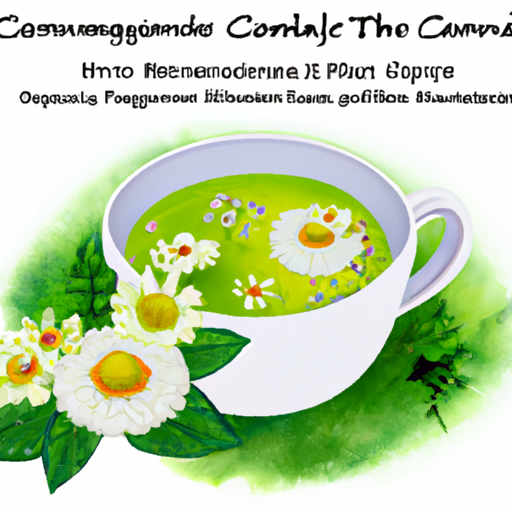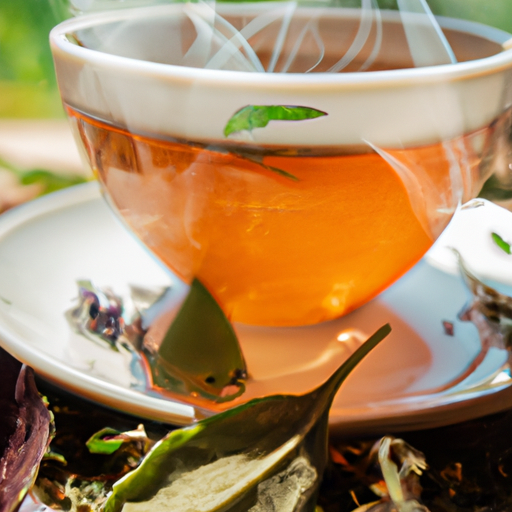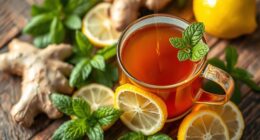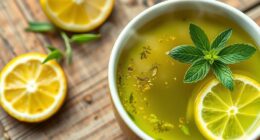Picture this: you’re navigating the vast and mysterious sea of pregnancy, searching for safe and comforting shores to anchor yourself. As the waves of cravings and discomfort ebb and flow, there is one ally that can provide solace and nourishment: herbal tea.
Just like a trusted lighthouse guiding ships to safety, certain herbal teas can be a beacon of relief for expectant mothers.
In this article, I will share with you a selection of herbal teas that are not only safe but also beneficial during pregnancy. These teas have been carefully chosen based on their soothing properties and their ability to support the unique needs of a pregnant body.
From the calming embrace of chamomile tea to the invigorating warmth of ginger tea, each herbal brew offers its own set of advantages.
We will explore the benefits of peppermint tea for digestion, the gentle boost of raspberry leaf tea for uterine health, and the mineral-rich nettle leaf tea for overall nourishment.
So, grab your favorite teacup and join me on this enlightening journey as we discover the herbal teas that can bring comfort, wellness, and peace to your pregnancy voyage.
Key Takeaways
- Herbal tea can provide solace and nourishment during pregnancy.
- Chamomile tea promotes better sleep, has anti-inflammatory properties, and supports a healthy pregnancy.
- Peppermint tea soothes digestion issues, but excessive consumption may have potential risks.
- Ginger tea alleviates morning sickness, reduces nausea, and aids digestion.
Chamomile Tea
Chamomile tea is a fantastic option for expecting moms looking for a soothing and safe herbal tea to enjoy during pregnancy. Not only does it offer a delightful taste, but it also provides numerous benefits for both the mind and body.
One of the key advantages of chamomile tea is its ability to promote better sleep. Its natural compounds have a calming effect on the nervous system, helping to ease anxiety and promote relaxation, making it an ideal choice for pregnant women who may struggle with sleep disturbances.
Additionally, chamomile tea is known for its anti-inflammatory and anti-bacterial properties, which can help alleviate common pregnancy discomforts such as nausea and indigestion.
Now, let’s move on to the next herbal tea that is safe for pregnant women: peppermint tea.
Peppermint Tea
Peppermint is a popular choice for expectant mothers, but can it provide relief for digestion issues? Absolutely! Peppermint tea is known for its soothing properties, and it can be a great natural remedy for common pregnancy discomforts like bloating and indigestion.
Not only does it help relax the muscles in the gastrointestinal tract, but it also has a cooling effect that can alleviate heartburn and nausea.
When it comes to pregnancy benefits, peppermint tea is a winner. It can help improve digestion, reduce gas and bloating, and promote overall comfort. However, it’s important to note that excessive consumption of peppermint tea during pregnancy may have some potential risks. It may relax the lower esophageal sphincter, which can lead to acid reflux. Additionally, it’s best to consult with your healthcare provider before incorporating peppermint tea into your pregnancy routine.
Now, let’s move on to the next herbal tea that is safe for pregnant women: ginger tea.
Ginger Tea
Ginger tea, known for its aromatic and invigorating qualities, offers pregnant women a natural remedy for various discomforts. The benefits of ginger tea during pregnancy are numerous. It helps alleviate morning sickness, reduces nausea, and aids digestion. The anti-inflammatory properties of ginger can also alleviate joint pain and swelling, common during pregnancy. To make ginger tea, simply peel and slice fresh ginger root, then steep it in hot water for about 10 minutes. You can add a squeeze of lemon or a teaspoon of honey for some added flavor. It’s important to note that excessive consumption of ginger tea should be avoided, as it may cause heartburn or interfere with certain medications.
Now, let’s explore the benefits of another herbal tea safe for pregnant women, rooibos tea.
Rooibos Tea
Rooibos tea is a fantastic choice for those looking to reap the benefits of antioxidants and minerals. This herbal tea is packed with these essential nutrients, which can help boost the immune system and protect against oxidative damage.
Additionally, Rooibos tea is known for its ability to support healthy digestion and promote relaxation, making it an excellent choice for those seeking a calming beverage.
Packed with antioxidants and minerals
Chamomile tea, with its soothing aroma and calming properties, is like a gentle hug for your body, providing you with a nourishing dose of antioxidants and minerals. During pregnancy, it offers numerous benefits, making it a safe and beneficial choice for expectant mothers. Here are three reasons why chamomile tea is a great addition to your pregnancy routine:
-
Supports a healthy pregnancy: Chamomile tea is known for its anti-inflammatory properties, which can help reduce swelling and discomfort during pregnancy. It also aids in promoting a healthy immune system, protecting both you and your baby.
-
Recommended intake: It’s important to note that moderation is key when consuming chamomile tea during pregnancy. Experts recommend limiting your intake to one to two cups per day to ensure you reap the benefits without any potential risks.
-
Promotes relaxation and healthy digestion: Chamomile tea has natural calming properties that can help reduce stress and anxiety, promoting a sense of relaxation. Additionally, it supports healthy digestion, helping to alleviate common pregnancy discomforts such as bloating and indigestion.
With its multitude of benefits, chamomile tea is a safe and delicious choice for expectant mothers. Now let’s explore how it supports healthy digestion and promotes relaxation.
Supports healthy digestion and promotes relaxation
Indulge in the soothing warmth and comforting aroma of this natural beverage, allowing it to work its magic on your body, promoting a sense of relaxation and supporting healthy digestion.
During pregnancy, it’s important to find safe and beneficial ways to relax and support your digestive system. Herbal tea can be a great option, as it offers numerous benefits for both relaxation and digestion.
Certain herbal teas, such as chamomile and peppermint, have been found to have calming effects on the body, helping to reduce stress and anxiety. Additionally, these teas can aid in digestion by soothing the stomach and relieving symptoms of indigestion and bloating.
When selecting herbal teas for relaxation and digestion during pregnancy, it’s important to choose ones that are caffeine-free and made from safe ingredients.
Transitioning into the subsequent section about lemon balm tea, this herbal infusion is known for its calming properties and can be a great addition to your pregnancy tea collection.
Lemon Balm Tea
Sip on a cup of refreshing Lemon Balm Tea and feel the calming effects as you embrace the soothing aroma. Lemon balm tea, derived from the leaves of the Melissa officinalis plant, has a long history of use for its various health benefits.
This herbal tea is known for its ability to support healthy digestion and promote relaxation. It can help alleviate digestive discomfort, reduce bloating, and ease indigestion. Lemon balm tea also has a mild sedative effect, making it an excellent choice for those seeking a natural way to relax and unwind.
To make a delicious cup of lemon balm tea, steep one teaspoon of dried lemon balm leaves in a cup of hot water for about 5 minutes.
Now, let’s transition into the subsequent section about raspberry leaf tea.
Raspberry Leaf Tea
Immerse yourself in the invigorating flavors of raspberry leaf tea, as the vibrant red hues swirl in your cup, transporting you to a serene garden blooming with ripe berries.
Raspberry leaf tea has been cherished for centuries due to its numerous benefits during pregnancy. This herbal tea is known to strengthen and tone the uterus, promoting a smoother labor and potentially reducing the risk of complications. Additionally, raspberry leaf tea is rich in vitamins and minerals, including vitamin C, iron, and calcium, which are essential for a healthy pregnancy.
To enjoy these benefits, it’s generally recommended to start drinking raspberry leaf tea in the second trimester and gradually increase the dosage. However, it’s important to consult with your healthcare provider before incorporating any herbal tea into your pregnancy routine.
Transitioning to our next topic, let’s explore the benefits of nettle leaf tea.
Nettle Leaf Tea
Step into a rejuvenating world with nettle leaf tea, where the earthy aroma and vibrant green hues transport you to a lush garden bursting with vitality. During pregnancy, nettle leaf tea offers numerous benefits. It’s a rich source of essential nutrients such as iron, calcium, and vitamin K, which are vital for the healthy development of both the mother and the baby. It also alleviates common pregnancy symptoms like nausea, leg cramps, and swelling due to its diuretic properties. To reap these benefits, it’s recommended to consume 1-2 cups of nettle leaf tea daily. However, it’s important to consult with a healthcare professional before adding nettle leaf tea to your pregnancy routine, as individual circumstances may vary.
Frequently Asked Questions
Can herbal teas be consumed during any trimester of pregnancy?
Herbal teas can be safely consumed during any trimester of pregnancy. They offer benefits for overall maternal health and can be a natural alternative to medication for pregnancy discomforts.
Are there any potential side effects or risks associated with drinking herbal teas during pregnancy?
Drinking herbal teas during pregnancy may have potential benefits, but it’s important to be aware of potential side effects or risks. It’s always best to consult with a healthcare professional for advice on alternative remedies.
Can herbal teas help with common pregnancy symptoms such as morning sickness or indigestion?
Herbal teas can be beneficial during pregnancy for overall well-being. Certain types, such as ginger or peppermint tea, are known to alleviate common symptoms like morning sickness or indigestion.
Are there any herbal teas that should be avoided during pregnancy?
During pregnancy, it is important to be cautious about certain herbal teas. Some herbal teas may not be safe due to potential risks. It is always best to consult with a healthcare professional for guidance on which teas to avoid.
How many cups of herbal tea are safe to consume per day during pregnancy?
During pregnancy, it is generally safe to consume up to 2-3 cups of herbal tea per day. However, it is important to choose herbal teas that are known to be safe and consult with a healthcare professional for personalized advice. Herbal teas can provide various benefits during pregnancy, such as relieving nausea, promoting relaxation, and boosting immune health.
Conclusion
In conclusion, when it comes to choosing herbal teas during pregnancy, there are several safe options available.
Chamomile tea can provide relaxation and relieve anxiety, while peppermint tea can alleviate nausea and aid digestion.
Ginger tea is known for its anti-inflammatory properties and can help with morning sickness.
Rooibos tea is caffeine-free and packed with antioxidants, making it a healthy choice.
Lemon balm tea promotes calmness and restful sleep, while raspberry leaf tea is believed to strengthen the uterus.
Nettle leaf tea is rich in vitamins and minerals, making it a nourishing option.
So, sip on these soothing brews and enjoy a healthy pregnancy journey. Like a gentle breeze on a sunny day, these herbal teas will provide comfort and nourishment, guiding you through this beautiful phase of life.










